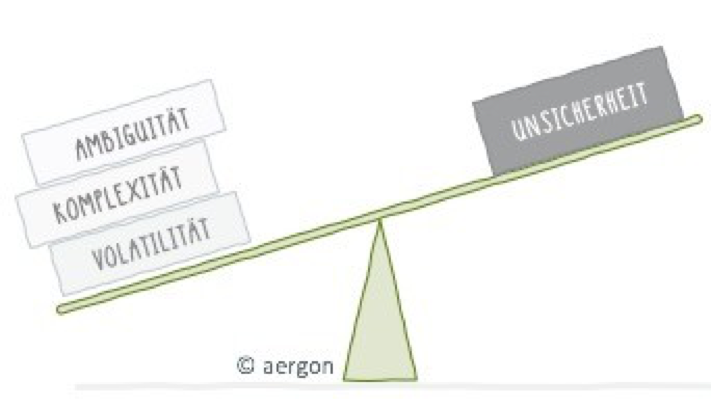Achieving successful digital transformation, requires a calm and collected mindset
Digital transformation unfolds an intensified dynamic inside a company which, together with the external dynamic, becomes increasingly powerful. The acronym VUCA (volatility, uncertainty, complexity, ambiguity), which originated from the military vocabulary of the 1990s, resonates with the experience of many in times of digitalization. More and more VUCA as phenomena results in increasing uncertainty.

Under pressure in the "default mode”
This poses considerable challenges for employees and managers in particular. More than ever, they are challenged not only to counter this dynamic and to resolve it, but at best to anticipate in it so as to avoid potential problems or conflicts. This pressure partly explains why executives often return to their “default-mode”: Action! This often blind activism can be learnt and has a fairly good success rate, at least in the eyes of managers. Many managers are happy being thought of as a tough executer, who is able to roll up his sleeves and conjure an innovative strategy out of his pocket. Female managers also pretend to be strong men. Managers feel needed here, they think that they are making a difference and dopamine is released.
Always stay smooth and supple
In his article "Immer schön geschmeidig bleiben" in the philosophy magazine Hohe Luft, Editor-in-chief Thomas Vašek describes this teleological action concept (telos = purpose, goal) as an illusion having the future at its disposal. But a company is not a closed system, as it is influenced by constantly changing and sometimes even unknown external and internal factors. Life cannot be planned, but can instead be surfed like a wave. And it is not only visible factors that have an effect, but invisible ones – such as corporate culture – have an even stronger one. The consequences? Uncertainty, complexity and volatility within the company continue to increase. Tectonic forces are being fired up and unpredictable movements are trying to find their way in companies and teams.
New strategies and one-sided communication avalanches not only keep the company in suspense, but also often hold it back from doing actual business, from providing a service to the customer. This is meaningless activism, which remains ineffective because it wants to force an impact and is not integrated into the overall context, i.e. the orientation towards the vision. If a plan does not come to fruition, the blame is attributed to these external factors and/or new activities are launched at breakneck speed, and the steering wheel gets out of control.
In the face of all this activism, managers are constantly busy and lose sight of what is really important. In our book dlead – Führen in digitalen Zeiten we call it Lost in Transformation. The solution is not to do something different again, but to do something differently.
The principle of inaction
Thomas Vašek refers to the Chinese philosopher Laotzi (600 BC), who taught the principle of non-acting (wúwéi). This means renouncing a plan, not forcing it, but letting it happen. To act without acting. It is not the selective action that is in the foreground, but – with a view to the overall process – the change, the transformation of processes, so that these can unfold a beneficial effect. The grass does not grow any faster if you pull on it.
In terms of leadership, this means giving employees more opportunities to act and removing barriers in order to pave the way for the inherent forces of the system. Frederic Laloux found a nice metaphor for this in his book Reinventing Organzations: In complex systems such as nature, there is no decision from above on the first of April that the trees have to sprout. Instead, such happenings were cultivated into the system of nature by creation, so that every plant does what is necessary at the right moment – no more and no less. Similarly, companies have become such complex systems that the management of just a few no longer leads to the goal and causes more damage than benefits.
Thomas Vašek recommends that managers reassess and evaluate the respective situation over and over again. To let things mature in order to grasp the immanence, the inner potential and to let it work. Busyness is not efficiency, activism is not effectiveness.
Harvesting the fruits of digitalization
Only then can digitalization be implemented correctly and can lead to “more time”, “more relief from routines” and “more room for personal communication and development” within a company. Instead of “more strain”, “constant excessive demands” and a de facto “decrease in personal exchange” and “free development opportunities” on the job. For this, however, many managers must first put their own behavior patterns and mental patterns to the test and adapt them in order to lead their ship through the storm with a calm hand. Once again, less is more.








